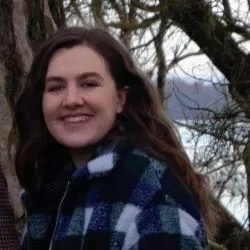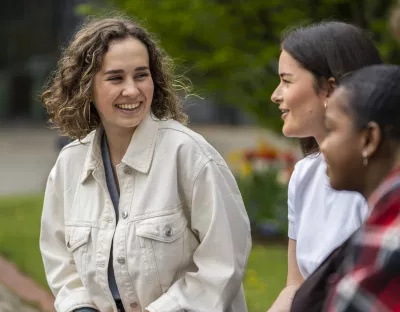Key Info
History
Entry route(s):
History can be taken on both LM002 Bachelor of Arts & LM019 Bachelor of Science in Social Sciences. Subject combinations & course structures can be reviewed on the appropriate programme page.
About you
Above all else, you have a curiosity about and a passion for understanding people, events and ideas in the past, and how societies changed over time; you love to read and engage with historical debates; you are excited about ‘discovery’ and rise to the challenge of working with original sources and documents. You want to give yourself the opportunity to read path-breaking historical works and to learn more about the writing of history. You want to engage with past events and processes that have helped us to understand ourselves and the world that we live in. You want to know more about culture, in the broadest sense. You have an ability to both narrate and analyse phenomena, and you want to express yourself as eloquently and effectively as possible. You are open to new ideas, and to the power of the past to inform, influence, and convince.
Why study History at UL?
The historians at UL are acknowledged scholars in their fields of research, and are committed to student-centred learning; they offer exciting and innovative modules throughout the four years of study. The history programme at UL will enable you to develop critical and analytical skills through an appreciation of primary sources, historiography and key events and changes, as well as through the study of the social, cultural and historical contexts in which change was produced. You will learn about source analysis, the processes informing history writing from the fifteenth century to the contemporary world. You can choose electives to suit your own interests, in Irish, European, American, and international history; you can focus on political, social, cultural, urban, and gendered approaches to history.
Learn more about our courses and upcoming events
What you will study
History at UL has a number of key components or themes that run throughout the four years of their programme leading to specialist options in the final year, among these are the following:
- Documentary sources analysis and theory, critical historical practice.
- Historical schools/eras in history- writing/historiography since classical times until the present day.
- General electives in late-medieval European history (Renaissance/ Reformation/Counter-Reformation); warfare and diplomacy in 17th Century; political history of Irish nationalism/ republicanism; the cultural and social history of everyday life in Ireland since the 18th Century; America/Irish relations; Europe and the Middle East since the 19th Century; historiography.
- Specialist electives on sixteenth- and seventeenth-century Spain; Ireland and America; Holocaust; the cultural history of the city in sixteenth- and seventeenth-century Germany; cultural history of the Weimar Republic.
Modules are offered on both Bachelor of Arts (LM002) and BSc. Social Sciences (LM019) - Both are subject to change.
| Year 1 | Semester 1 | Semester 2 | |
| HI4071 | Doing History: past, present and practice | HI4142 | Games of Thrones: Gender, Power and Identity, Ireland and the Wider World, 1500-1950 |
| Year 2 | Semester 3 | Semester 4 | |
| Students select 2 or 4 depending on their programme of study | Cooperative Education Work Placement | ||
| HI4063 | Nasty and Brutish: Early Modern Europe, c. 1500-1700 | ||
| HI4073 | From the Prophet to ISIS: the Middle East and Europe: ancient to modern | ||
| HI4083 | Making Ireland British: Early Modern Ireland, 1436-1750 | ||
| HI4103 | Imagining Ireland: from early Modern to Modern | ||
| Year 3 | Semester 5 | Semester 6 | |
| Erasmus/Exchange placement with a partner institution abroad | Students select 2 or 4 depending on their programme of study | ||
| HI4046 | Contesting the past: writing history | ||
| HI4056 | New Heaven, New Earth: power and belief in the European Reformation 1517-1618 | ||
| HI4066 | Absolutes and Revolutionaries: Europe in the age of Enlightenment 1688-1815 | ||
| HI4076 | Patriots to Parnell: Ireland, 1750-1891 | ||
| Year 4 | Semester 7 | Semester 8 | |
| HI4247 | Empires, nations and Union: Europe, 1848-1992 | HI4158 | Culture and anarchy: Ireland in the twentieth century |
| Students select 1 or 3 depending on their programme of study | Students select 1 or 3 depending on their programme of study | ||
| HI4077 | Metropolis, the German urban experience 1900-1945 | HI4077 | Metropolis, the German urban experience 1900-1945 |
| HI4107 | Conservatives, Patriots and radicals politics and political ideology in eighteenth-century Britain and Ireland | HI4107 | Conservatives, patriots and radicals politics and political ideology in eighteenth-century Britain and Ireland |
| HI4117 | The Irish Conflict, 1948-98 | HI4117 | The Irish Conflict, 1948-98 |
| HI4127 | Understanding the Holocaust in twentieth-century Europe | HI4127 | Understanding the Holocaust in twentieth-century Europe |
| HI4207 | The Global empire: the Spanish monarch, Europe and America, 1479-1598 | HI4207 | The Global empire: the Spanish monarch, Europe and America, 1479-1598 |
| HI4217 | The Early Modern City, 1500-1800 | HI4217 | The Early Modern City, 1500-1800 |
| HI4227 | Golden Age: Politics, Culture and Warfare in the Spanish Monarchy, 1598-1746 | HI4227 | Golden Age: Politics, Culture and Warfare in the Spanish Monarchy, 1598-1746 |
| HI4237 | Modern Middle East and the Arab-Israeli Conflict | HI4237 | Modern Middle East and the Arab-Israeli Conflict |
| HI4307 | Health, Gender, State and Irish medical care, 1837-1948 | HI4307 | Health, Gender, State and Irish medical care, 1837-1948 |
Entry requirements
| Additional considerations |
Entry requirements are dependent on your programme of choice. Please click your preferred programme below: For certain subjects, additional special qualifications specific to individual subjects or disciplines may be determined by the respective departments in accordance with Academic Council regulations. Applications are especially welcome from Mature Students. Mature applicants must apply through the Central Applications Office (CAO) by 1 February. QQI Entry Certain QQI Awards are acceptable in fulfilling admission requirements for both LM002 and LM019. More information on the UL Admissions QQI page including a full list of modules. |
|---|---|
| Non-EU Entry Requirements |
|
How to apply
| Where are you applying from? | How to Apply |
|---|---|
| Ireland | Irish students must apply to UL via the CAO. More information can be found here. |
| The UK | Students who have completed their A-Levels can apply to UL via the CAO. More information can be found on the Academic Registry website. |
| The EU | EU Students can apply to UL via the CAO. More information can be found on the Academic Registry website. |
| Non-EU country | If you are outside of the EU, you can apply for this subject through the Bachelor of Arts degree or |
Fees and funding
Student course fees are broken into three components - Student contribution, Student Levy and Tuition Fees.
A number of illustrative examples of fees for this course based on the current fee levels have been set out in the tables below.
An explanation of the components, how to determine status and the criteria involved is provided below the examples as is a list of possible scholarships and funding available.
EU Students with Free fees status in receipt of a SUSI grant
| HEA pays | Tuition Fees | €2,558 |
| SUSI pays | Student contribution | €3,000 |
| Student pays | Student Levy | €102 |
| Total | €5,660 |
EU Students with Free fees status not in receipt of a grant
| HEA pays | Tuition Fees | €2,558 |
| Student pays | Student contribution | €3,000 |
| Student pays | Student Levy | €102 |
| Total | €5,660 |
Students with EU fee status not in receipt of a grant
| Student pays | Tuition Fees | €2,558 |
| Student pays | Student contribution | €3,000 |
| Student pays | Student Levy | €102 |
| Total | €5,660 |
Non-EU Students
| Student pays | Tuition Fees | €16,798 |
| Student pays | Student Levy | €102 |
| Total | €16,900 |
Student course fees are comprised of the following components:
Student Contribution
Annual charge set by the government for all full-time third level students. All students are liable unless they have been approved for a grant by Student Universal Support Ireland (SUSI). Please refer to https://www.studentfinance.ie to determine your eligibility for a grant and for instructions on how to apply. The current student contribution is set at €3000.
Student Levy
All students are liable to pay the Student Levy of €102. Please note the Student Levy is not covered by the SUSI Grant.
Tuition Fees
These are based on Residency, Citizenship, Course requirements.
Review the three groups of criteria to determine your fee status as follows
-
Residency
- You must have been living in an EU/EEA member state or Switzerland for at least 3 of the 5 years before starting your course
-
Citizenship
- You must be a citizen of an EU/EEA member state or Switzerland or have official refugee status
-
Course Requirements
(all must be met)
- You must be a first time full-time undergraduate (Exceptions are provided for students who hold a Level 6 or Level 7 qualification and are progressing to a Level 8 course in the same general area of study).
- You must be undertaking a full-time undergraduate course of at least 2 years' duration
- You cannot be undertaking a repeat year of study at the same level unless evidence of exceptional circumstances eg serious illness is provided (in which case this condition may be waived)
Depending on how you meet these criteria your status will be one of the following -
- Free Fee Status: You satisfy all three categories (1, 2 and 3) and therefore are eligible for the Higher Education Authority’s Free Fees scheme.
- EU Fee Status: You satisfy both the citizenship and residency criteria but fail to satisfy the course requirements and are liable to EU fees.
- Non EU Fee Status: You do not meet either the citizenship or residency criteria and are therefore liable to Non EU fees.
More information about fees can be found on the Finance website
These scholarships are available for all courses
| Title | Award | Scholarships Available |
|---|---|---|
| All Ireland Scholarships - sponsored by J.P. McManus | €6,750 | 125 |
| Brad Duffy Access Scholarship | €5,000 for one year | 1 |
| Bursary for my Future Scholarship | €2,750 one off payment | 4 |
| Civic Engagement Scholarship | €1500 | 1 |
| Cooperative Education Award | 1 medal per faculty | |
| Elaine Fagan Scholarship | €1,500 | |
| Financial Aid Fund | ||
| Hegarty Family Access Scholarships | €5,000 for one year | 2 |
| Higher Education Grants & VEC Grants | ||
| Irish American Partnership Access Scholarships | €5,000 | 2 |
| Paddy Dooley Rowing Scholarship | €2,500 | |
| Plassey Campus Centre Scholarship Programme | ||
| Provincial GAA Bursaries Scheme | €750 | |
| Stuart Mangan Scholarship | ||
| The Michael Hillery and Jacinta O’Brien Athletics Scholarship | Various benefits equating to over €7,000 in value | |
| UL Sports Scholarships | Varies depending on level of Scholarship | Multiple |
Your future career
- Professional administration/management
- International/European organizations
- Archivist/Museum curator/Librarian
- Development and research in voluntary organizations/NGOs
- Public service, nationally or locally
- Research and teaching at third level
- Teacher (Professional Master of Education required)
Follow-On Study
- MA History
- MA History of Family
- MA Local History
- MA Journalism
- MA in Public History & Cultural Heritage
Student Profile
Morgan Leigh
After finishing school and working full-time for three years, I decided that I wanted to return to education. I took a QQI course in Liberal Arts which led me to the BA Arts programme at UL. I did not have a particular career goal in mind, so I chose the subjects I enjoyed studying the most including History.
I was drawn towards the style of writing used in the practice of history. It was in that criticality and engagement that I saw the potential to develop a really valuable skillset. You are not simply learning about history, but learning what good history is, and how to produce it. The modules are quite broad, they cover either a long time-period or a variety of topics. That allows you to really explore the subject and discover what you enjoy discussing and researching the most.
The faculty in the Department of History are second to none, which was what made my decision to study it in the end. Very early on I got the sense of how supportive both the lecturers and tutors are. They have always been approachable and provided excellent guidance.
If I can offer any advice, it would be to follow your interests. If you are unsure of what you will gain from the course in terms of career options, consider what skills it has to offer you and how you could put them to use. Studying history is an excellent way to develop your critical thinking and research skills which are valuable in many lines of work. It is important to study subjects you want to learn more about, doing so will only invite more opportunity.


